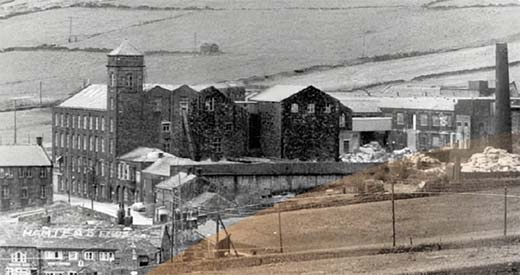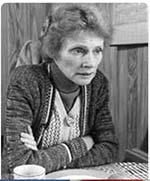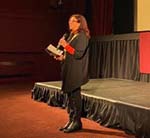
Alice a fight for life
Tuesday, 4 October 2022
Around 70 people attended the screening of the documentary Alice a Fight for Life at Hebden Bridge Cinema on Thursday 29th September. The event was a well organised Charity screening by RWK Goodman to remember Alice Jefferson.
 Alice lived in Mytholmroyd and had worked at Cape Asbestos's Acre Mill in Old Town (see above) for a few months as a teenager. In her forties, Alice began to suffer breathlessness. By 1980, she was incapacitated with the disease pleural mesothelioma. She took part in a Yorkshire Television produced, award winning documentary called Alice a fight for Life which went out on July 20th 1982. The documentary went out at peak viewing time.
Alice lived in Mytholmroyd and had worked at Cape Asbestos's Acre Mill in Old Town (see above) for a few months as a teenager. In her forties, Alice began to suffer breathlessness. By 1980, she was incapacitated with the disease pleural mesothelioma. She took part in a Yorkshire Television produced, award winning documentary called Alice a fight for Life which went out on July 20th 1982. The documentary went out at peak viewing time.
Retired local solicitor John Pickering represented Alice in her compensation claim against Cape Asbestos. The programme was an important catalyst for legal change and public awareness of the plight of the victims of asbestos. The Hebweb and Mytholmroyd websites remembered Alice in this article 25 years later.
In October 2002, John Pickering's colleague Anthony Coombes wrote about John Pickering's memories of Alice Jefferson's case against Cape Asbestos in Hebden Bridge. He visited her at home. She had left notes stuck on walls in her house to her children reminding them to do the various things they would have to do to keep the house and their lives in order, because she knew she would not be with them in 3 months.
Forty years on from the screening yesterday, nothing was lost in the power of Alice's story to move those of us in the room, including John Pickering.
Extract from the book Law and the Whirligig of Time by Sir Stephen Sedley reproduced here with his permission:
As a teenager, Alice Jefferson worked in Acre Mill, the asbestos factory in Hebden Bridge. There was loose asbestos all over the place: they skylarked and made wigs out of it. Now in her early forties she has mesothelioma, the asbestos cancer, and she is dying. John Pickering, her solicitor, has broken all records and got her case to court within a few months of issuing the writ. He wants a judge to see what happens to the victims, not just to read about it when it's all over bar the dependency.
"It takes Alice Jefferson ten minutes to get up the steps of the courthouse. Every movement is pain. She ought to have died by now, says the physician who has come to give evidence for her. We talk a little with her, Even with her sunken face and unnaturally bright eyes she is a handsome person. She has kept all her remaining energy to tell her story to the judge, and she does it with clarity and determination. Whatever they say, she does not intend to die. She has a teenage son and a little girl of four. The boy can cope, though he says he doesn't mind how ill she is if she'll only live. The girl - her husband does his best, but he won't be able to do her hair properly for school. Sitting behind my leader, the gentle and able David Turner-Samuels, I am blind with tears. Nobody must see.
"The judge gives her every penny he can, but it's nothing. Alice isn't a lawyer or a surgeon. Her loss of earnings is limited to a few years' wages as a part-time cleaner. And what price can anyone put on the pain in her side and in her heart?
"Three months later Alice is dead. Yorkshire TV have made a film about her. When it is shown, 'Alice, a fight for life' moves a lot of people and spurs the campaign to ban the use of asbestos. But the title has been changed by the lawyers: the working title was 'Getting away with murder'. "
Interview with John Willis the maker of the film Alice a fight for life: Cover ups and double standards in the asbestos industry:
Extract from "Solicitor John Pickering retires - December 10, 2004:
"Mr Pickering estimated the number of deaths at between 500 and 750 since Cape Asbestos took over the mill in 1939. He said the total number of asbestos related-illness cases would be between 1,750 to 2,000. But more recently there has been a rise in people dying from mesothelioma, an incurable cancer of the lungs, usually related to asbestos." (See Solicitor John Pickering retires, a 2004 HebWeb report)
The Hebweb previously covered made a feature on the story of Acre mill - see Asbestos and the legacy of Acre Mill.

Photo: RWK Goodman
A panel of experts including a mesothelioma nurse, an engineer, a barrister, a junior barrister, an Activity and Support Co-ordinator for Yorkshire and Humberside Asbestos Support Group SARAG and a lawyer answered questions in the Q&A which took place after the film, including questions from members of the audience who worked at Cape. Photo of the panel.
 Hebden Royd Mayor Jane Hoyle addressed the room (pictured right) and talked of the overwhelming sadness many people in Hebden Bridge associated with events surrounding Acre Mill.
Hebden Royd Mayor Jane Hoyle addressed the room (pictured right) and talked of the overwhelming sadness many people in Hebden Bridge associated with events surrounding Acre Mill.
There were short videos from SARAG Yorkshire and Humberside Asbestos Support and Lippy People - Lippy People is a video storytelling charity that supports people to share their lived experiences, develop their video storytelling skills and share the learning they have taken from the challenges they have faced.
The event ran over the times advertised because the Q&A went on longer than was anticipated.
It was an excellent event and will no doubt help to keep people informed of the dangers of asbestos. Too many people still don't know about this dangerous substance.
All donations for this event went to these charities: Cheshire Asbestos Victims Support Group (CAVSG), Cumbria and Lancashire Asbestos Support Advice Group (CLASAG), Derbyshire Asbestos Support Team (DAST), Greater Manchester Asbestos Victims Support Group (GMAVSG), Hampshire Asbestos Support and Awareness Group (HASAG), Merseyside Asbestos Victims Support Group (MAVSG), Mesothelioma UK (MESO UK), MESSY, Readley Asbestos and Mesothelioma Support (READLEY), South West Asbestos and Support Awareness Group (SWASAG) and Yorkshire and Humberside Asbestos Support.
Thanks to Fay Robinson for this report
Links
Alice Jefferson interview - Youtube
Remembering Alice Jefferson - 25 years on - The Mytholmroyd Net, 2007
Cover ups and double standards in the asbestos industry - John Willis, talks about his investigation into asbestos-related cancer and how Alice a fight for Life changed attitudes towards this dangerous chemical.

